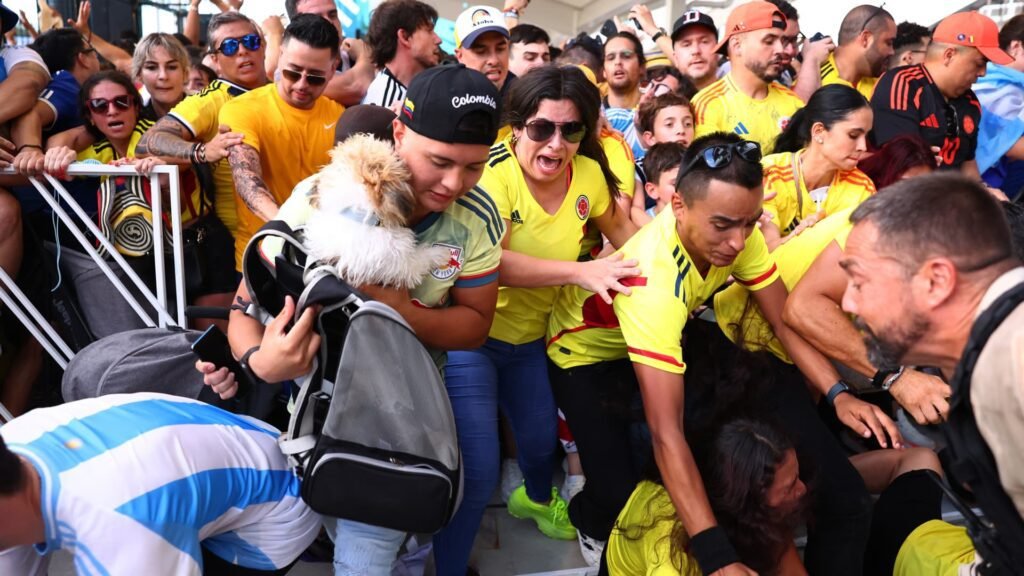Colombian and Argentine fans watch the CONMEBOL Copa America 2024 Final match between Argentina and Colombia at Hard Rock Stadium in Miami Gardens, Florida on July 14, 2024.
Maddie Meyer | Getty Images
Chaos erupted at Miami’s Hard Rock Stadium during soccer’s Copa America final between Argentina and Colombia on Sunday, raising questions about the United States’ preparations to co-host the 2026 World Cup.
The stadium, home to the NFL’s Miami Dolphins and with a capacity of more than 65,000, became overcrowded as fans without tickets swarmed the gates and scaled security barriers and air vents to get in.
Facilities and fences were damaged, ticketed fans were locked out of their seats by non-paying spectators, and the match was ultimately postponed for more than 80 minutes before finishing with Argentina beating Colombia just after midnight. (This year, the event was extended even further by adding a halftime show, a league first.)
“This is, without question, not just embarrassing, but absurd,” said Anjali Bal, an associate professor of entertainment and sports marketing at Babson College.
Miami-Dade County Commissioner Oliver Gilbert said at a press conference Monday that law enforcement officials are working with promoters and the stadium to ensure this incident doesn’t happen again.
“We host major events and I’ve never seen anything like what we saw last night and I don’t think we’ll ever see it again,” Gilbert said.
According to arrest warrants, a total of 27 people were arrested, including Colombian Football Federation president Ramon Jesulon and his son, who are suspected of attacking three security guards who prevented them from entering the stadium.
The Miami-Dade Fire Department said it responded to a total of 120 incidents in the stadium and surrounding areas, 116 of which were medical calls.
A large group of fans try to enter the stadium amid commotion ahead of the CONMEBOL Copa America 2024 Final between Argentina and Colombia at Hard Rock Stadium in Miami Gardens, Florida on July 14, 2024.
Megan Briggs | Getty Images
“The only blessing is that no one has died, but it appears a lot of people are in very difficult situations. This was entirely avoidable,” Lee Burke, CEO of LHB Sports Entertainment & Media, told CNBC.
The debacle has raised questions about America’s preparations for a major soccer event just two years before the global showcase begins.
The United States will co-host the 2026 tournament, along with Canada and Mexico, and will host 78 of the 104 World Cup matches. The final will be played at MetLife Stadium in New Jersey, while Hard Rock Stadium, site of the upset Copa America final, will host seven matches, including the third-place match.
Chief among the criticisms was what some say was a lack of security checkpoints and perimeters to stop traffic flowing into the stadium.
“I don’t think the organisers made adequate preparations to deal with the large numbers of spectators in the stadiums,” Burke said.
The South American Football Confederation (CONMEBOL) slammed the Hard Rock Stadium in a press release on Monday, saying stadium officials had failed to take into account safety recommendations issued by the confederation.
Hard Rock, meanwhile, said it had “implemented and, in many cases, exceeded CONMEBOL’s security recommendations.”
World Cup Warm-up
While this is not the first Copa hosted by the United States (the US first accepted the hosting role in 2016), the championship is seen by many as a precursor to the 2026 World Cup.
“The only good thing that can be said is that there is an undue sense of concern about an event that is two years away,” Bal said. “When you have so many issues in a dress rehearsal, it doesn’t bode well for the show.”
According to the Sports Business Journal, an estimated 5 million fans are expected to visit 16 host cities across the United States, Canada and Mexico over the 38-day tournament.
Burke said he thought the U.S. was well-equipped to handle that number and that FIFA would handle it well.
“This country has great experience in running events. There’s probably no other country on earth with a better skill set, with people and organisations who know how to run events and keep fans safe,” Burke said. “If that expertise is harnessed, it will absolutely be a huge success.”
Bal said the Copa Cup failure could provide a roadmap for a successful 2026 World Cup.
In addition to security concerns for the final, several American stadiums have come under fire for the turf used in football stadiums hosting matches in the lead-up to the tournament. Argentina national team coach Lionel Scaloni told reporters at a post-match press conference last month that the fields were in poor condition and unfit for players.
“If we recognize all the issues and think we have a team that deals with turf issues and a team that deals with security issues, I think we can solve the problems,” Bal said.




